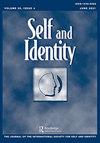Bored and better: Interpersonal boredom results in people feeling not only superior to the boring individual, but also to others
IF 2.1
4区 心理学
Q3 PSYCHOLOGY, SOCIAL
引用次数: 0
Abstract
ABSTRACT Four experiments tested the hypothesis that meeting someone new who is boring would result in people feeling superior to the boring individual, which would then result in people viewing themselves as better than others and increased confidence. Respondents reported greater feelings of superiority, meaninglessness, and difficulty paying attention when they wrote about meeting a new, boring individual than a new or manipulative individual. Feeling superior, but not meaninglessness and attention, mediated the effect of interpersonal boredom on viewing oneself as better than others, but not on confidence. These finding did not occur when people wrote about a boring task or a disliked, manipulative individual. The experiments elucidate how interpersonal boredom, albeit a negative experience, can enhance people’s sense of self.无聊和更好:人际关系的无聊导致人们不仅觉得比无聊的人优越,而且比其他人优越
四个实验验证了这样一个假设:认识一个无聊的新朋友会让人们觉得自己比那个无聊的人更优秀,从而使人们觉得自己比别人更好,从而增加了信心。受访者报告说,当他们写到与一个新的、无聊的人见面时,比写到与一个新的或控制欲强的人见面时,他们会有更大的优越感、无意义感和更难集中注意力的感觉。“优越感”(而非“无意义感”和“关注感”)介导了人际无聊对自我优越感的影响,但对自信没有作用。当人们写一项无聊的任务或一个不喜欢的、控制欲强的人时,这些发现就不会出现。这些实验阐明了人际无聊虽然是一种消极的经历,但却能增强人们的自我意识。
本文章由计算机程序翻译,如有差异,请以英文原文为准。
求助全文
约1分钟内获得全文
求助全文
来源期刊

Self and Identity
PSYCHOLOGY, SOCIAL-
CiteScore
5.10
自引率
5.00%
发文量
26
期刊介绍:
Work on self and identity has a special place in the study of human nature, as self-concerns are arguably at the center of individuals" striving for well-being and for making sense of one"s life. Life goals develop and are influenced by one"s view of what one is like, the way one would ideally like to be (or would like to avoid being), as well as one"s perceptions of what is feasible. Furthermore, conceptions of self and the world affect how one"s progress towards these goals is monitored, evaluated, redirected, re-evaluated, and pursued again. Thus, the “self” as a construct has far-reaching implications for behavior, self-esteem, motivation, experience of emotions and the world more broadly, and hence for interpersonal relationships, society, and culture.
 求助内容:
求助内容: 应助结果提醒方式:
应助结果提醒方式:


